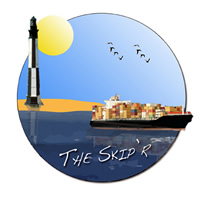Following an increase in the number of incidents aboard cruise vessels from Fall 2011 to Spring 2013, including a number of large fires, blackouts, and the unfortunate loss of the Costa Concordia, the public has begun to question the safety record of the cruise industry.
For example, the public wants to know who is directly responsible for cruise ship safety. Well, the simple answer is that responsibility for safety starts and ends with ship owners and managers.
However, owners often seek assistance from classification (class) societies in identifying and evaluating safety risks. Although often referenced in the maritime world, class society roles and responsibilities relating to vessel safety are not widely known.
History
As noted by the International Association of Classification Societies, a class society is an independent, self-regulating, externally audited body that has no commercial interests related to ship design, building, ownership, operation, management, maintenance, repairs, insurance, or chartering. This lack of commercial interest is a significant safeguard to ensure the independence and integrity of class societies.
The first classification societies, founded in the latter half of the 18th century, served as a system for the independent technical assessment of ships that were presented for insurance coverage. As such, their initial role was to “classify” (rate) a ship annually. The societies used a series of ratings:
- A, E, I, O, U for the condition of the ship’s hull;
- good, middling, or bad (later changed to 1, 2, 3) for the ship’s equipment.
Based upon this rating, an insurer could better determine the risk involved with covering the vessel and then price the coverage accordingly. However, throughout the years, classification societies have established their own set of rules that would allow them to classify vessels more readily by measuring compliance with more standardized, predefined criteria. These rules continued to develop as the classification societies’ experience and technological expertise grew, eventually evolving to specifically include requirements commonly recognized as safety critical and sound principles for how a ship should be designed, built, equipped, and maintained.
As these principles and rules developed, they were increasingly seen as absolute requirements, such that the rating aspect has mostly disappeared, and an owner must maintain the vessel in compliance with its class society’s rules for the vessel to be considered to be “in” class.1 This is significant, since in accordance with the International Convention for the Safety of Life at Sea (SOLAS), vessels are not authorized to operate without being in class.
What Does a Class Society Do?
The primary role a class society plays in relation to vessel safety is that of an independent third party that develops and enforces a set of standards for the design and maintenance of the vessel’s hull and appendages, as well as the suitability of the machinery installed for propulsion, power generation, steering, and other auxiliary systems.
This role may begin before the ship is built. During the design phase (prior to design approval) vessel owners can choose to engage the classification society to provide advice on features they are considering. This helps identify new technology or systems that can or should be included in the design and helps the owner to develop methodologies to certify these systems and their maintenance. After the design of a new vessel is prepared, the class society will ensure it complies with the society’s rules.
Once the design is approved, the class society then audits the building process, as the new vessel cannot be approved as “in class” unless the shipyard complies with the approved design criteria. Once the building phase is completed and the vessel is determined to be in compliance with the rules, it is issued a class certificate.
The vessel then enters the operation phase, where proper maintenance is the most critical factor. Vessel owners are responsible for proper maintenance, and class surveyors perform periodic vessel surveys. For a passenger ship, DNV GL typically assigns two surveyors to attend the vessel and verify the condition of the hull and machinery through a sampling process (up to 100 percent of a system or component, depending on the results found by the surveyor). A set of annual surveys takes approximately seven days to complete.
In addition, there are other periodic surveys at various times throughout the vessel’s 5-year class certificate validity. These include internal boiler inspections, internal examination and pressure testing of tanks integral with the hull, and bottom surveys where the vessel is inspected out of the water (there are provisions for in-water surveys in certain situations).
Recognized Organizations
Classification societies can also undertake the role of recognized organization or RO. As an RO, the class society acts on behalf of the vessel’s chosen flag administration (flag) to verify compliance with the various international instruments to which the flag is signatory, such as the International Convention on the Safety of Life at Sea.
This role is a natural fit, due to the technical knowledge and experience that class societies possess among their surveyors, auditors, and plan approval engineers, as well as the worldwide presence of class society survey stations.
With its global presence, the class society can quickly respond to survey any damage and discuss the various options that will allow the vessel to return to service sooner. It is important, however, to keep in mind that as an RO, the class society acts solely on behalf of the flag and not in its individual capacity. Thus, if the damage involves equipment related to the statutory certificates, the flag (rather than the class society) retains all authority to determine whether to allow the vessel to sail in a condition other than full compliance with the applicable international instruments. This means that in cases where an exemption from specific SOLAS requirements is needed to allow the ship to sail, the class society briefs the flag on the issue and provides technical justification for the requested exemption or other equivalency, and then the flag, in its sole discretion, will grant or deny the authorization to proceed.
Advisory Roles
Another role that class societies often play is that of advisor to the owner. Respecting its independent third-party role regarding overseeing compliance with the class rules, a classification society will not provide advice on the safety-critical elements covered by its rules. Thus, areas where a class society can provide advisory services are not safety-critical, although they are still important for the owner. Proper ship maintenance and operation, including such crucial activities as navigation and following up the documented routines for maintenance of safety critical parts of the ship including safety barriers, is the sole responsibility of the owner.
Technology, innovation, and national and international rules and regulations are constantly changing, and owners often need outside assistance to increase the level of ship superintendents’ knowledge, competence, and compliance. Accordingly, owners often seek a class society’s advice regarding such changes.
When requested, a class society can conduct meetings with owners, superintendents, and staff to:
- advise on new rules and regulations,
- discuss significant findings from recent surveys or audits for the owner to ensure compliance in the rest of its fleet,
- share information about casualties and risks faced by the industry as a whole,
- present relevant technical topics covering ship equipment.
Regardless of the advice, it is up to the owner to accept or reject instituting the recommendations.
Class societies undertake many roles in the passenger ship industry, and, in keeping with its purpose—to safeguard life, property, and the environment—DNV GL strives to fulfil these roles in the most effective and proficient manner possible. Nevertheless, it is important for the industry to keep in mind that the responsibility for ensuring safety on passenger vessels starts and ends with owners.
Endnote
1www.iacs.org.uk/document/public/explained/Class_WhatWhy&How.pdf
George Zeitler, MSc, has over 30 years of experience in the Marine Industry in various regulatory, management, and consulting roles. He is an Accredited Marine Surveyor (Y&SC) by the Society of Accredited Marine Surveyors and a Member of the International Institute of Marine Surveying. He uses his vast experience verifying Compliance with Applicable Maritime Laws / Regulations through on site surveys and audits of client's vessels. His years of operational and regulatory enforcement help provide clients with a unique perspective that is key in identifying vulnerabilities onboard vessels as well as gaps in policies and procedures. He functions as a Court Appointed Monitor in situations where vessel operators are negotiating a plea agreement for a DOJ-approved Environmental Compliance Programs.
©Copyright - All Rights Reserved
DO NOT REPRODUCE WITHOUT WRITTEN PERMISSION BY AUTHOR.










